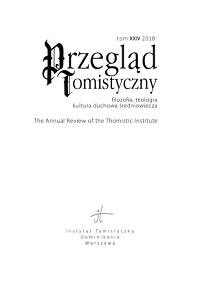Bartłomiej z Jasła i „czeska devotio moderna” w Krakowie. Kazanie „Hoc epulum comedas” na Wielki Czwartek
Bartholomew of Jasło and the “Bohemian Devotio Moderna” In Kraków. The Sermon Hoc Epulum Comedas for Maundy Thursday
Author(s): Dagmara Wójcik-Zega, Włodzimierz ZegaSubject(s): Christian Theology and Religion, Philosophy of Middle Ages
Published by: Instytut Tomistyczny
Keywords: Bartholomew of Jasło; medieval preaching; Eucharist; sermon for Maundy Thursday; devotio moderna; Poland; Bohemia; Matthew of Kraków; Henry of Hessen (of Langenstein); Thomas of Ireland; Stanislas of
Summary/Abstract: The article concerns Bartholomew of Jasło’s sermon on the Holy Communion which was probably delivered during the Maundy Thursday mass in 1393 in Kraków. The first part of this research provides a historical and doctrinal introduction to the sermon. The authorship, the manuscript and textual tradition, the date and occasion of delivering the sermon are discussed here. The evidence concerning the date of the sermon is based on the examination of paper watermarks and supported by textual comparisons. The study of Bartholomew’s sources reveals his textual and doctrinal dependence, besides the Bible and other works, on Compendium theologicae veritatis by Hugh Ripelin of Strasbourg, Dialogus rationis et conscientiae de crebra communione by Matthew of Kraków, De discretion spirituum by Henry of Langenstein and Manipulus florum by Thomas of Ireland. Bartholomew of Jasło was undoubtedly inspired by the “new theology” of Matthew of Kraków; he encourages believers to remain in a state of grace and to care about their internal disposition and readiness to receive the Holy Communion. It is worth pointing out, however, that in spite of the extensive use of Matthew’s Dialogus rationis et conscientiae, which is most representative of Bohemian devotio moderna, Bartholomew did not share Matthew’s teaching on the frequent communion for the laity.Appendix 1 presents the evidence that Matthew’s Dialogus rationis et conscientiae was used in Kraków in the first half of the 15t century by Stanislas of Skalbmierz in his Sermones sapientiales. Appendix 2 shows that the quotation concerning the idea of translatio studii („Felicia antiquorum tempora...”) in the two Bartholomew’s sermons was taken most probably from Manipulus florum and not from Compendiloquium by John of Wales.The last part of the article contains a critical edition of Bartholomew of Jasło’s sermon with an editorial introduction. The corrected text of the sermon is known from Bartholomew’s autograph preserved in the MS Kraków, Jagiellonian Library, 2192 (B); as well, some additions (B*) and revisions (B²) have been done by the author himself.
Journal: Przegląd Tomistyczny
- Issue Year: 2018
- Issue No: XXIV
- Page Range: 135-190
- Page Count: 56
- Language: Polish

